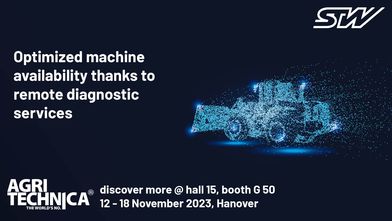Harvesting processes are usually "just-in-time". The logistics in the background, be it transport of the harvested crop or the subsequent sale of the goods, are precisely timed. Repairs or unplanned maintenance during the harvesting process need to be prevented. Remote diagnostic services can help here.
If the harvesting machine is at a standstill in the field, it poses a major problem. A trailer is usually ready and waiting at the edge of the field to transport the harvest for processing or storage. If there are delays in the process, it can be expensive and even detrimental to the overall harvest, for example, if there is a bad weather front approaching.
Smooth operation of the harvesting machinery during the harvesting process, regardless of which crop, is essential for the economic success of agricultural operations. Ideally, machine downtimes need to prevented in advance. For example, condition monitoring and preventative maintenance of the most important machine components helps reduce unforeseen maintenance and repairs during the harvest time.
Nevertheless, unforeseen circumstances can always lead to a service case. It is then important that the service is carried out quickly and competently, so that the harvest process is delayed as little as possible and that there are no further machine failures. Remote diagnostics are useful here. They support the service personnel on site in analyzing the fault and resolving the cause of a breakdown. Naturally, remote diagnostics are useful in other mobile machine applications, especially in the construction industry for example. In road construction, with its temperature-dependent manufacturing processes, the demands on availability are silimar to those in agriculture.
Should a machine come to a standstill, service personnel can use the remote diagnostics to contact experts from the machine manufacturer. This means that the necessary know-how is potentially available at any time and any place, making the service process as efficient as possible. Particularly in view of the increasing complexity of working machines and a shortage of maintenance personnel, remote diagnostic services can be a unique selling point for machine manufacturers. With remote diagnostics, machine operators can be confident that service experts are in a position to help as efficiently as possible, whenever service is required.
A further advantage of remote diagnostic services is the direct digital monitoring of the machine, which can significantly reduce misdiagnosis. The machine operator on site is often not in a position to correctly identify the cause of the machine failure, making accurate diagnosis difficult. By reading out the operating states and error codes, personnel connected via remote diagnostic services can precisely determine the cause of failure and initiate the correct remedial actions.
For the future, proactive recommendations for action via remote diagnostics service are also feasible. Upcoming maintenance can be indicated, and operating performance can be analyzed by experts or automatically. The machine operator benefits from more effective machine use and even further improved availability.
In order for machine manufacturers to be able to offer these services, they need networked machines and the appropriate cloud services. At Agritechnica from 12 to 18 November in Hanover, STW will present, among other things, its robust TCG-4 communication modules at Stand G50 in Hall 15.
TCG-4 communication modules are the basis for implementing remote diagnostics or over-the-air update services and enable worldwide communication through cloud platforms such as Amazon Web Services (AWS) or machines.cloud.
more information about Agritechnica
